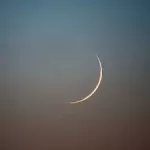Jun 4, 2022

A Black Moon... This word combination might sound enigmatic and even frightening. Let’s figure out if there is something to worry about with this from starwalk.apace.
"Black Moon" is not a unified term used in astronomy. Here are the most common definitions:
The first definition designates a Black Moon as the second New Moon in a calendar month;
According to the second definition, a Black Moon is the third out of four New Moons in an astronomical season;
Also, this expression is used when there’s no New Moon in a month. This can only happen in February because it is the only month that is shorter than a lunar month.
Is Black Moon a Full Moon?
Rarely, a Black Moon refers to an event when there’s no Full Moon in a month. This occurs once every 19 years: the last time was in 2018, and the next time will be in 2037.
Is New Moon the same as Black Moon?
Some people say “Black Moon” to denote every New Moon, not just a specific one, because, in this phase, the Moon is unlit and invisible. However, the definitions listed above are used much more often.
How to see a Black Moon?
A Black Moon is not the best object for observation. According to the definitions above, a Black Moon is a particular New Moon. During its new phase, the Moon always faces the Earth with its unlit side and therefore is invisible to us. In other words, you can’t see a Black Moon. The most attentive observers might only notice the disappearance of the stars occulted by the lunar disk in the night sky.
There is only one way to see a New Moon or a Black Moon, and we’ll discuss it later.
When is the next Black Moon?
It’s hard to say when the next Black Moon will occur because this definition isn’t fixed and might refer to different Moon phases. Here are all the possible answers depending on the definitions mentioned above:
On April 30, 2022, we saw the Black Moon, which was the second New Moon in a single calendar month;
The New Moon of May 19, 2023, might be called Black as it will be the third out of four New Moons of that season;
There will be no New Moon in February 2033, which falls under the third definition of Black Moon given above.
Three Black Moons
In the first three months of 2022, people in some parts of North America might have had three Black Moons in a row. The New Moons of January 31 and March 31 were both the second in a month, and there was no New Moon in February.
Next time, the same sequence will occur in 2033 for most of the globe. That year, the New Moons of January 30 and March 30 will be the second in a month, and in February, there will be no New Moon.
Black Super Moon
A Supermoon occurs when the New or Full Moon coincides with the perigee – the Moon’s closest approach to the Earth. But can a Supermoon also be a Black Moon? Yes!
On August 20, 2028, the third New Moon of the season will approach the Earth closer than usual. Although the event will not be observable, like any other New Moons, “Black Super Moon” still sounds intriguing, doesn’t it?
Black Moon and April Solar Eclipse 2022
A Black Moon can also cover the Sun. The lunar disk casts a shadow on the Earth, and people in this area can observe a solar eclipse. This is the way to easily see a Black Moon.
On April 30, 2022, at 20:42 GMT, we might see a partial solar eclipse involving the second New Moon in a month. The eclipse will be visible to observers from some parts of South America, Antarctica, and the Pacific and Atlantic Oceans. According to the Eclipse Guide app, the best observation spot is Punta Arenas, Chile. Open the app to find out which eclipse will be visible over your city or somewhere nearby.
Black Moon and Dark Moon
Unlike “Black Moon”, the term “Dark Moon” may refer to any New Moon as it denotes the period when the Moon is in conjunction with the Sun and is invisible to the naked eye. Astronomers of the past used the term “New Moon” to denote both the waxing crescent and a completely dark lunar disk. Not to get confused, they would say "Dark Moon" when referring to the unlit Moon. The term is sometimes used nowadays.
Bottom line: Black Moon has no single definition, and it is just a way to denote а particular New Moon. For the observers, a Black Moon is no different from the usual New Moon and owes its hype to a mysterious-sounding name.
Share this article with friends!
Tags:
#black#moon,#dark#moon,#solar#partial#eclipse,#starzpsychics

